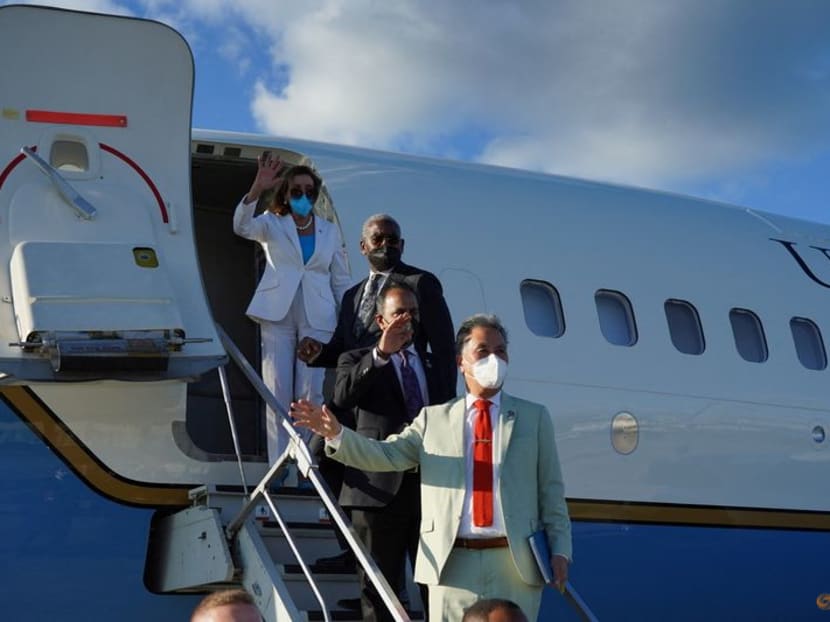Explainer: Why US House Speaker Nancy Pelosi's Taiwan visit has repercussions on regional stability
SINGAPORE — A visit to Taiwan by the United States House of Representatives Speaker Nancy Pelosi on Tuesday (Aug 2) has been met with anger and criticism from the authorities and people of mainland China, who called the visit a threat to peace and stability in the Taiwan Strait.

Mrs Nancy Pelosi (back of row), the United States House of Representatives Speaker, waving with other members of a delegation as they board a plane before leaving Taipei Songshan Airport, in Taipei, Taiwan, on Aug 3, 2022.
- A visit by US House Speaker Nancy Pelosi to Taiwan on Aug 2 has incited anger and criticism from China
- Mrs Pelosi is the highest-profile elected US official to visit Taiwan in 25 years
- In the wake of her visit, China has launched acts of retaliation such as trade curbs
- Experts told TODAY that such heightened tensions would affect regional stability, on which Singapore thrives
SINGAPORE — A visit to Taiwan on Tuesday (Aug 2) by Mrs Nancy Pelosi, the United States House of Representatives Speaker, has been met with anger and criticism from the authorities and people of mainland China, who called the visit a threat to peace and stability in the Taiwan Strait.
Second in line to the US presidency after American vice-president Kamala Harris, Mrs Pelosi is the highest-profile elected US official to visit Taiwan in 25 years. She, along with the rest of her delegation, touched down in Songshan Airport at downtown Taipei on Tuesday night after visiting Malaysia as part of her Asian tour.
Relations between Taiwan and China have been strained for years, as China considers Taiwan a breakaway province that should be part of its territory.
In the wake of Mrs Pelosi's visit, China has launched several acts of retaliation such as trade curbs on Taiwan and military drills near the island.
TODAY spoke to experts to find out the significance of Mrs Pelosi’s visit, why there has been backlash from China and if the region, including Singapore, should be concerned about these unfolding events.
SIGNIFICANCE OF THE VISIT
Speaking to TODAY, Assistant Professor Dylan Loh from Nanyang Technological University (NTU) said that Mrs Pelosi’s trip to Taiwan is significant to China because the Chinese “see this as a provocative departure from the ‘one-China’ policy”.
Under the policy, the US recognises that there is only one Chinese government and acknowledges that Taiwan is part of China.
However, Asst Prof Loh said that there has been a “divergence in interpretations” regarding the US’ one-China policy in recent years.
“Beijing naturally expects no official interactions between US and Taiwanese politicians and officials, but Washington does not see this as necessarily contravening its one-China policy,” Asst Prof Loh, who is from NTU’s public policy and global affairs division, explained.
Despite criticism from the Chinese government, the White House on Monday said that Mrs Pelosi has the right to visit Taiwan in her role as US House Speaker since the US Congress is an independent branch of government, and nothing had changed about America’s one-China policy.
Beyond what China perceives as a violation of the one-China policy, the immense backlash caused by the visit is also grounded in a broader set of grievances that it has against the US — including “persistent attempts to contain China” and to allegedly lend support to "independence forces" in Taiwan, Asst Prof Loh said.
Agreeing, Dr Pan Zhengqi, a senior lecturer from the School of Business at the Singapore University of Social Sciences (SUSS), said: “For China, the trip signifies political intimidation and disrespect to the country’s sovereignty and territorial integrity.”
Dr Pan specialises in international political economy and international relations, with a focus on China and Asia.
HOW ARE EVENTS UNFOLDING AND WHAT’S NEXT?
The day after Mrs Pelosi landed in Taiwan, China's Customs Administration announced that it would suspend some citrus fruit imports from Taiwan due to alleged repeated detection of excessive pesticide residue, and the import of fish because tests on packages tested positive for Covid-19.
The Chinese Commerce Ministry also said that it would suspend the export of natural sand to Taiwan from Wednesday.
Apart from trade curbs, the Chinese military declared that it would launch a series of targeted military actions in response to the visit, such as "long-range live ammunition shooting" in the Taiwan Strait.
The strait separates Taiwan from mainland China and is a vital route for ships passing China, Japan, South Korea and Taiwan.
Taiwan’s Transport Minister Wang Kwo-tsai said that the drills will also affect 18 aviation routes, though the impact on international flights will be limited.
Regarding escalating tensions, Asst Prof Loh from NTU said that further packages of response from China in various domains — military, diplomatic, economic and social — levelled against both US and Taiwan can be expected, but he does not think that these will “cross the threshold for conflict”.
Associate Professor Chong Ja Ian, from the political science department of the National University of Singapore (NUS), said: “Pelosi’s visit and any friction that results is a function of ongoing friction between the US and China, as well as between Taiwan and China. It is not a cause in itself.
“It may amplify some of the existing dynamics, but will not fundamentally change it.”
WHAT ARE THE REPERCUSSIONS?
Experts told TODAY that such heightened tensions would inadvertently have an effect on Singapore, though it would depend on how events play out.
Asst Prof Loh said: “Every country in the region, including Singapore, will feel a degraded sense of security especially when tensions are heightened so much. It certainly does not help when countries like Singapore are just seeing slivers of economic recovery.
“Nevertheless, longer-term implications will depend on how the situation pans out.”
For the region, which is already plagued with supply chain disruptions and the ongoing Covid-19 pandemic, Dr Pan from SUSS said that Mrs Pelosi's trip to Taiwan “does not aid in geopolitical predictability and stability, and wedges the region in great power rivalry”.
“Singapore thrives on a stable and predictable region. As such, heightened tensions between China and Taiwan would hurt our interests,” he explained.
Assoc Prof Chong from NUS said that one takeaway for Singapore may be “to think through situations where there is greater US-China contestation such that 'not choosing sides' becomes increasingly risky, or even costly.”
“Thinking about how Singapore can diversify risks such that we are not overly exposed to any single market may be something worth considering as well.”











